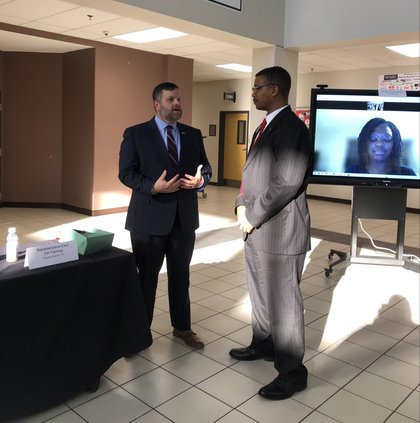COVINGTON, Ga. — Most of the county’s restructured legislative delegation told about their plans and made predictions about the upcoming 2023 Georgia General Assembly session Thursday.
One freshman legislator, District 114 Rep.-Elect Tim Fleming of Covington, also predicted the session beginning Jan. 9 will be a “budget-driven” event with “a lot of focus” on tax reform.
Chamber members and some elected and appointed local officials heard from four of five members of the delegation during the Newton Chamber of Commerce’s annual Pre-Legislative Breakfast Thursday at Newton College and Career Academy (NCCA).
After NCCA culinary students served attendees breakfast, current members District 113 State Rep. Sharon Henderson, D-Covington, and District 43 State Sen. Tonya Anderson, D-Lithonia, joined with new members Fleming and District 93 State Rep. Doreen Carter, D-Lithonia, to give their thoughts about the 2023 session.
District 17 State Sen. Brian Strickland, R-McDonough, did not attend.
Legislative redistricting in 2021 reduced the former six-member Newton delegation to five members. They will represent three House and two Senate districts partly or wholly within Newton County.
Fleming, a Republican who formerly worked as Gov. Brian Kemp’s chief of staff, said the state House will see a “really changed dynamic” in the 2023 session as it adjusts to 40 new members and a new Speaker of the House.
Longtime Speaker David Ralston died on Nov. 16 after 12 years in the powerful position. House Republicans, who hold at least a 100-80 majority following this year’s election, have nominated Savannah-area Rep. Jon Burns to replace him.
Fleming said he believed the House will focus on tax reform and “money coming back to homeowners and property owners.”
The General Assembly has provided the state government with “good budgets” in recent years. This year’s state budget likely will reflect lawmakers’ desire to be prepared for the uncertainty of “what the future will hold” for the state’s economic condition, Fleming said.
He said he wanted to be appointed to committees focusing on areas like public safety to provide the “tools they need” to do their jobs properly.
Fleming, who is also a former Newton County commissioner, said he wanted to see affordable education in the state’s post-secondary education system to meet the future demand for a well-trained workforce.
Newton County has seen numerous new and expanded industries in recent years, from Takeda Pharmaceuticals and Facebook’s data centers to SKC Inc.’s new semiconductor company Absolics, as well as its close proximity to the planned Rivian electric vehicle production facility.
“All eyes are on Newton County,” Fleming said.
Anderson will be participating in her sixth Senate session and her 10th overall after serving four years in a House seat.
She said workforce development will be important to Newton County as it continues to be a regional economic engine and add new industries.
Anderson said the state needed to expand Medicare to give more low-income Georgians better access to health care.
Henderson, entering her third session, said her goal is to back any legislation in 2023 to help veterans, seniors and special needs children. Seniors need more affordable housing and some relief from inflation, while parents of handicapped children need rehabilitation services closer to home than Atlanta, she said.
She was a member of the Budget and Fiscal Affairs Oversight; Game, Fish & Parks; and Retirement committees.
Carter, whose district added northwest Newton following the 2021 redistricting, will take part in her seventh legislative session in 2023. She served as a member of the Code Revision, Education, Industry and Labor, Special Rules and Small Business Development committees.
Encouraging industries that pay “a living wage” to open in Georgia, and continuing to adequately fund the Quality Basic Education funding formula for public school districts, are among her goals for the session, Carter said.
Retiring State Rep. Dave Belton of Morgan County also spoke and implored lawmakers to work more closely with members of the opposite party.
Members who do not favor other member’s legislation should understand their colleagues have “reasons” for authoring or supporting that legislation, he said.
“It’s not a good job,” he said. “People are not kind to each other.”





